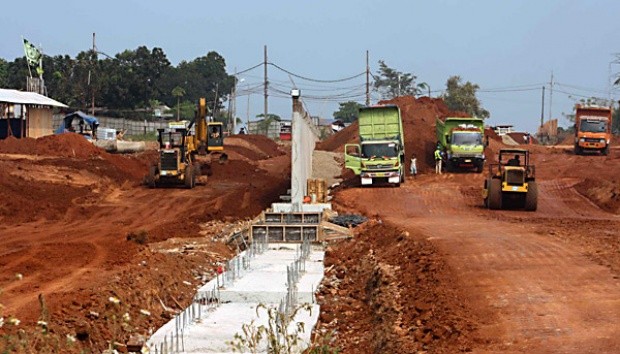Popular Reads
Top Results
Can't find what you're looking for?
View all search resultsPopular Reads
Top Results
Can't find what you're looking for?
View all search resultsHow REITs can jump start real estate, infrastructure investment
REITs have become popular since starting in the US in the 1950s. They are now present in over 30 countries. In 2015, market capitalization was US$1 trillion in the US and $2 trillion worldwide, while growth has been in the double-digits after the 2008 crisis.What makes this instrument so popular?
Change text size
Gift Premium Articles
to Anyone
T
he government recently reduced the tax burden for Real Estate Investment Trusts (REITs), with an aim to jump start the property sector, and, as we will argue, the infrastructure sector as well. This family of instruments can also ease the supply constraint in the capital market.
What are REITs?
In essence, they bridge big-ticket property ownership with the small retail investor base.
How? Divide a large property ownership into affordable units. These units then distribute rental payments as a kind of dividend.
It works for commercial properties such as hospitals, shopping malls and even apartments. It can also work for data centers, power plants and others.
REITs have become popular since starting in the US in the 1950s. They are now present in over 30 countries. In 2015, market capitalization was US$1 trillion in the US and $2 trillion worldwide, while growth has been in the double-digits after the 2008 crisis.
What makes this instrument so popular?
Its return consists of price appreciation plus a steady income stream. In many countries they enjoy low taxation, as governments encourage retail ownership of property. Meanwhile, real estate developers can monetize their projects in short order and move on.
Otherwise, it will take a long time to sell an entire building.
These arguments have persuaded Lippo Karawaci to use REITs with great success. It has created two REITs in Singapore, each owning Lippo developed malls and hospitals.
The total assets of these two units were about S$3 billion ($2.3 billion) in 2015. The hospital REITs account for 4200 beds in Indonesia, while mall REITs control about 780,000-square meters of retail space.
These make them among the largest hospital and shopping area owners in Indonesia.
But the question is why are they listed in Singapore instead of here?
Until recently REITs have had to pay a lot of taxes. First the land and building acquisition tax.
Then they have to pay income taxes. REITs are usually structured with layers of ownership. Hence their tax burden rises to unaffordable levels.
The government recognizes the potential of this instrument. Hence it removed the double taxation last October. This year it reduced the income tax to affordable levels. It also asked regional governments to help by slashing property sales tax. Several provinces, including Jakarta, said they are eager to take part.
What are the benefits of a vibrant REITs market?
It plays an important role in at least three areas. One is to unlock funding for the property sector. Second is its potential for infrastructure funding. And, third is to provide new instruments in the capital market.
Until now, property developers to a large degree have relied on bank funding. Developers borrow to build then sell off or rent parcels of their projects.
This can take time, especially when selling the property at one go. Using REITs, developers can speed up the sale of pieces or entire buildings. That enables them to move on to the next project.
How does it work for infrastructure?
Toll road developers, for example, can sell operating assets. They can then use the proceeds to build the next road. This entails a change in their business model. The prevailing practice has been to build, then operate their assets.
These are then set as collateral for the next bank loan. What we propose here is to build, monetize and build again. In most cases, the REITs appoint the developer to operate their assets.
Hence the developer does not forego all operating income anyway. The same model can also apply to electricity and other infrastructure.
REITs should attract capital market investors by its steady income from safe assets. The Indonesian capital market suffers from a lack of instruments.
In 2015, new shares accounted for less than a quarter percent of the then market capitalization. Hence a steady supply of a new class of instruments would be welcome.
From the demand side, investors such as pension funds need current income. And REITs offer steady income in contrast to fluctuating share dividends.
We laud the government’s commitment to give tax breaks to REITs. Our study estimates that lowering taxes on REITs does not reduce tax revenues in the long run. In fact, tax revenues from REITs are on par with property funds or listed property companies.
Hence it is advisable that the concessions stay put for the long-run.
A vibrant property and infrastructure also bring indirect tax revenues. It comes from a slew of related activities such as construction, transportation and maintenance.
Thus, boosting REITs means promoting regional and national economic growth. It also helps the government budget in the long run.
***
The writer is chief economist of PT Danareksa. The views expressed are his own.
---------------
We are looking for information, opinions, and in-depth analysis from experts or scholars in a variety of fields. We choose articles based on facts or opinions about general news, as well as quality analysis and commentary about Indonesia or international events. Send your piece to community@jakpost.com. For more information click here.










